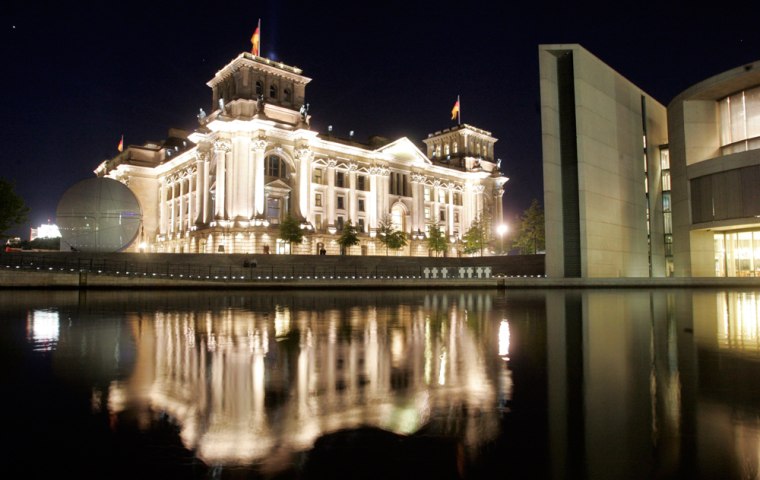Germans hope a month of World Cup soccer excitement will put some cash in business’ registers — and help the country shake off its international reputation as a stodgy economic giant mired in high labor costs and slow growth.
Retailers, restaurants and hotels are among expected winners as a million people stream into the country for the tournament, which begins Friday.
In addition, the government is using the worldwide attention to conduct a $29.4 million marketing campaign plugging Germany as a “Land of Ideas” and a good place to invest, with exhibits and events highlighting its tradition of science and innovation.
Economists say the overall spending involved could tack about 0.2 percentage point to economic growth for the year — not inconsiderable when estimates are for around a 1.8 percent increase, with Germany’s economy brightening amid stronger exports and new willingness by consumers to spend.
With the kickoff approaching, the sprawling government complex on the Spree River in central Berlin has been transformed into a large World Cup marketing camp. A large sculpture of an aspirin tablet stands near the Reichstag building, home to the parliament, as a tribute to Germany’s pharmaceutical industry. Across the lawn is a soccer shoe — a nod to the Dassler family, who founded shoemakers Adidas and Puma.
Adidas also built a one-third size replica of the Berlin Olympic Stadium that can seat 8,600 people right next to the Reichstag. People are paying $4 to watch games live on a big screen, and the first game — Germany vs. Costa Rica on Friday — is already sold out.
“On the one hand, the World Cup will definitely have an influence on perceptions of Germany,” said Stefan Chatrath, a sports marketing expert at Free University of Berlin’s School of Business and Economics. “The world will be looking at Germany for four weeks. ... The question is, of course how far an image campaign will influence decisions on where to locate business.”
Chatrath said that other factors — taxation, infrastructure and worker qualifications — had to back up the image.
“The other parts have to be right,” he said. “Image alone isn’t enough.”
He noted that some of the innovations being touted, such as Bayer’s reliable process for making aspirin, were in the distant past — although the “Land of Ideas” campaign also touts newer ones, such as MP3 audio compression technology.
Germany is working against its reputation as a high-cost location with lots of regulations and worker protections that have driven jobs and investment to lower-wage countries in Eastern Europe and Asia.
While this year’s growth prediction is on the sluggish side by Asian or North American standards, it is twice last year’s 0.9 percent. Unemployment ran at 10.8 percent in May, with 4.5 million people out of work. That’s down a bit from the previous month, but still chronically high.
Many economists blame rigid labor market rules and high payroll taxes, but the government of new Chancellor Angela Merkel has been slow to make politically painful changes in those areas.
Merkel herself shied away from any grandiose predictions about World Cup benefits.
“I am glad that we will have a lot of guests who will also consume and feel good in Germany, but we must turn to reforms for real long-term economic growth,” she said. “Those are the things I can influence, and apart from that I will be glad about every tenth of a point that, after the World Cup, is registered as extra income.”
Among the most optimistic are Germany’s retailers, who expect the tournament to contribute a $2.6 billion jolt of additional spending after several years of weak domestic demand. Germany’s restrictive legal store hours are being lengthened for the tournament.
“With special office and longer store opening hours, retailers are going to score points with World Cup fans,” said Hubertus Pellengahr, spokesman for the German retailing association.
Tourism officials are also optimistic, with the restaurant and hotel industry also upbeat but more cautious. DEHOGA, the German hospitality association, predicted sales would rise 1.5 percent this year, but warned that the boost from an estimated 3 million domestic and foreign World Cup visitors would be uneven.
Restaurants in the 12 host cities would benefit more than those elsewhere, and places like beer gardens that have the games on television would likely see more added revenue than high-class restaurants that do not. The crowds might also encourage regular customers to stay home, the association said.
Economist Michael Groemling at the Cologne Institute for Economic Research warned against expecting a big boost and said the actual impulse to growth could be less than the 0.2 percent to 0.3 percent that some have talked about.
“It is of minor relevance, quite small,” Groemling said.
For instance, visitors may spend a billion euros, but when compared with the $1.2 trillion in annual exports, it suddenly seems less significant, he said.
